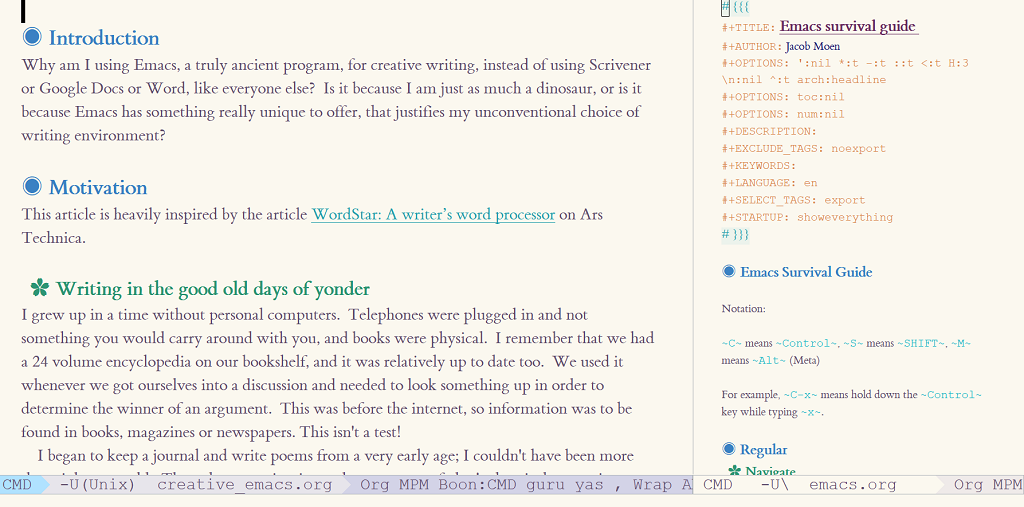Since my Emacs configuration is now built on top of Doom-Emacs, which uses a personal folder named .doom.d, I have now created a new repository for the continued development.
Find it here: https://github.com/jacmoe/.doom.d
I am not going to be using Evil mode, don’t worry. I am still relying on Boon-mode for modal editing.
Using Doom-Emacs makes it faster and more stable. And, to be honest, the code is a lot cleaner :)
My emacs configuration, optimized for creative writing.
This configuration requires at least Emacs 27.1.
If you have an older version installed, you need to install a new version. Version 27.2 is recommended, but 27.1 will do.
If you do not want to upgrade your version of Emacs, you can comment out the vertico section of init.el, but upgrading is going to be worth the trouble!
org-roam uses a custom SQLite binary to store its database, and it will compile it when it installs. So there must be a C compiler available to Emacs.
On Linux, there are very likely to be a C compiler installed, but Windows is different.
One option is to use MSYS2, which is Linux distribution for Windows. Follow the instructions on MSYS2 home page. Be sure to install the full mingw-w64 GCC software collection.
Make sure that you add the bin directory of you MSYS2 installation to your system path, so that Emacs can find it.
On my machine, I had to add C:\msys64\mingw64\bin
If Aspell is not installed, install aspell using your package manager.
Assuming that you installed MSYS2, including the mingw compiler suite, you can simply open up a MSYS2 command line and run:
pacman -Ss aspell
That will give you a list of aspell related packages to install.
Here’s the packages that I installed:
pacman -S mingw-w64-x86_64-aspell
pacman -S mingw-w64-x86_64-aspell-en
If you followed the guide for how to install the C compiler, then Emacs will be able to find aspell, and all should be well.
Proselint is required by the on-the-fly language checker.
Simply follow the Proselint installation instructions and make sure to, if on Windows, to add the location of the Proselint binary to your PATH. The message you get from Python’s pip installation procedure reminds you of what exact path you need to add.
Clone this repository, or download archive and extract, into .emacs.d in your home directory. That would be in C:/Users/[username]/.emacs.d on Windows, and ~/.emacs.d on Linux.
Create secret.el using secret.el.template as a template.
Important!
If you are on Windows, you need to set the HOME environment variable to point to your user directory (usually c:/Users/[username]). This Emacs configuration uses it to determine the location of the Emacs configuration directory when you are on Windows.
See the Emacs Survival Guide where most of the keyboard commands are listed. I usually have it open in a buffer for whenever I am wondering what keyboard command to use.
See my Creative Writing with Emacs blog post for a more thorough explanation, and rationale, for using Emacs for creative writing.
